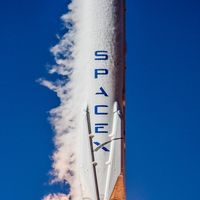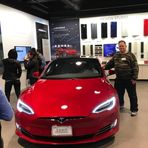The Musk Effect: Interest Rates and Misinformation in the Digital Age
August 5, 2024, 10:05 pm

Location: United States, District of Columbia, Washington
Employees: 5001-10000
Founded date: 2002
Total raised: $7.53B

Location: United States, Texas, Austin
Employees: 10001+
Founded date: 2003
Total raised: $3.86B

Location: United States, California, San Francisco
Employees: 1001-5000
Founded date: 2011
Elon Musk is a force of nature. His words can move markets and stir controversy. Recently, he made headlines for two distinct reasons: his call for the Federal Reserve to cut interest rates and the growing pressure on him to address misinformation on his social media platform, X. These events reflect a broader narrative about the intersection of finance, technology, and public trust.
Musk's comments on interest rates came after a week of disappointing economic data. The Federal Reserve had maintained its benchmark interest rate in the 5.25%-5.50% range, but cracks were appearing in the economic facade. Weak data suggested that the Fed might have kept rates too high for too long. In a world where every word from Musk can send ripples through the financial markets, his assertion that the Fed was "foolish" not to cut rates resonated. Traders are now betting on a rate cut at the Fed's upcoming meeting in mid-September. The stakes are high. A rate cut could stimulate spending and investment, but it also risks reigniting inflation.
Musk's influence is undeniable. He has a knack for capturing attention. His words can shift market sentiment like a gust of wind changes the course of a sailboat. But his influence extends beyond finance. As the owner of X, formerly Twitter, Musk is at the helm of a platform that has become a battleground for information and misinformation alike.
In a separate but equally pressing issue, five U.S. states are urging Musk to fix the AI chatbot, Grok, on X. This chatbot has been accused of spreading misinformation related to the upcoming elections. The stakes are high in this arena as well. Misinformation can sway public opinion and influence election outcomes. The secretaries of state from Minnesota, Pennsylvania, Washington, Michigan, and New Mexico have voiced their concerns. They argue that Grok's inaccuracies could mislead millions of voters.
The chatbot's false claims about Vice President Kamala Harris missing ballot deadlines have raised alarms. The officials are not just concerned about the chatbot's reach; they are worried about the implications for democracy itself. In an age where information travels faster than light, the responsibility of tech giants like Musk is immense. They hold the keys to the digital public square.
Musk's approach to content moderation has come under scrutiny. Since acquiring X, there have been allegations of increased hate speech and misinformation. Critics argue that Musk's laissez-faire attitude towards moderation has created a fertile ground for false narratives. The pressure is mounting. The secretaries of state are calling for immediate changes to ensure accurate information is disseminated. They suggest directing users to CanIVote.org, a nonpartisan resource for voting information.
The juxtaposition of Musk's financial commentary and the misinformation crisis highlights a critical tension in today's society. On one hand, we have the financial markets, where decisions are made based on data and predictions. On the other, we have social media, where the rapid spread of information can distort reality. The two worlds are colliding.
Musk's endorsement of Donald Trump adds another layer to this complex narrative. His political leanings have sparked debates about bias and the role of social media in shaping political discourse. The intersection of technology and politics is fraught with challenges. Misinformation can undermine trust in institutions. It can erode the very fabric of democracy.
As the presidential election approaches, the stakes are even higher. The potential for misinformation to influence voter behavior is a looming threat. Musk's platform, with its vast reach, is under the microscope. The call for accountability is growing louder.
In the financial realm, the Fed's decisions will shape the economic landscape. Interest rates affect everything from mortgages to business loans. A cut could provide relief to consumers and businesses alike. But it also carries risks. The delicate balance between stimulating growth and controlling inflation is a tightrope walk.
Musk's voice carries weight in both arenas. His call for a rate cut reflects a desire for economic stability. At the same time, his responsibility as a tech mogul is to ensure that his platform does not become a breeding ground for misinformation. The duality of his influence is striking.
In conclusion, Elon Musk stands at the crossroads of finance and technology. His words can ignite market movements and shape public discourse. As he navigates these turbulent waters, the implications of his actions will resonate far beyond his immediate sphere. The challenge lies in balancing innovation with responsibility. The world is watching. The stakes are high. The Musk effect is real, and its impact will be felt for years to come.
Musk's comments on interest rates came after a week of disappointing economic data. The Federal Reserve had maintained its benchmark interest rate in the 5.25%-5.50% range, but cracks were appearing in the economic facade. Weak data suggested that the Fed might have kept rates too high for too long. In a world where every word from Musk can send ripples through the financial markets, his assertion that the Fed was "foolish" not to cut rates resonated. Traders are now betting on a rate cut at the Fed's upcoming meeting in mid-September. The stakes are high. A rate cut could stimulate spending and investment, but it also risks reigniting inflation.
Musk's influence is undeniable. He has a knack for capturing attention. His words can shift market sentiment like a gust of wind changes the course of a sailboat. But his influence extends beyond finance. As the owner of X, formerly Twitter, Musk is at the helm of a platform that has become a battleground for information and misinformation alike.
In a separate but equally pressing issue, five U.S. states are urging Musk to fix the AI chatbot, Grok, on X. This chatbot has been accused of spreading misinformation related to the upcoming elections. The stakes are high in this arena as well. Misinformation can sway public opinion and influence election outcomes. The secretaries of state from Minnesota, Pennsylvania, Washington, Michigan, and New Mexico have voiced their concerns. They argue that Grok's inaccuracies could mislead millions of voters.
The chatbot's false claims about Vice President Kamala Harris missing ballot deadlines have raised alarms. The officials are not just concerned about the chatbot's reach; they are worried about the implications for democracy itself. In an age where information travels faster than light, the responsibility of tech giants like Musk is immense. They hold the keys to the digital public square.
Musk's approach to content moderation has come under scrutiny. Since acquiring X, there have been allegations of increased hate speech and misinformation. Critics argue that Musk's laissez-faire attitude towards moderation has created a fertile ground for false narratives. The pressure is mounting. The secretaries of state are calling for immediate changes to ensure accurate information is disseminated. They suggest directing users to CanIVote.org, a nonpartisan resource for voting information.
The juxtaposition of Musk's financial commentary and the misinformation crisis highlights a critical tension in today's society. On one hand, we have the financial markets, where decisions are made based on data and predictions. On the other, we have social media, where the rapid spread of information can distort reality. The two worlds are colliding.
Musk's endorsement of Donald Trump adds another layer to this complex narrative. His political leanings have sparked debates about bias and the role of social media in shaping political discourse. The intersection of technology and politics is fraught with challenges. Misinformation can undermine trust in institutions. It can erode the very fabric of democracy.
As the presidential election approaches, the stakes are even higher. The potential for misinformation to influence voter behavior is a looming threat. Musk's platform, with its vast reach, is under the microscope. The call for accountability is growing louder.
In the financial realm, the Fed's decisions will shape the economic landscape. Interest rates affect everything from mortgages to business loans. A cut could provide relief to consumers and businesses alike. But it also carries risks. The delicate balance between stimulating growth and controlling inflation is a tightrope walk.
Musk's voice carries weight in both arenas. His call for a rate cut reflects a desire for economic stability. At the same time, his responsibility as a tech mogul is to ensure that his platform does not become a breeding ground for misinformation. The duality of his influence is striking.
In conclusion, Elon Musk stands at the crossroads of finance and technology. His words can ignite market movements and shape public discourse. As he navigates these turbulent waters, the implications of his actions will resonate far beyond his immediate sphere. The challenge lies in balancing innovation with responsibility. The world is watching. The stakes are high. The Musk effect is real, and its impact will be felt for years to come.